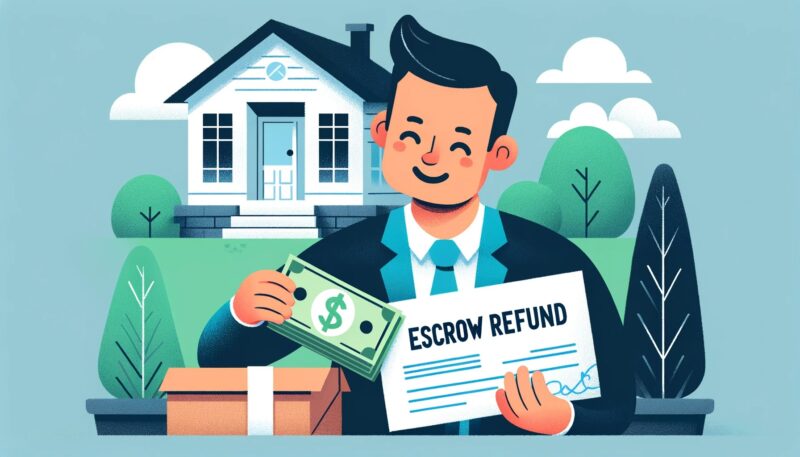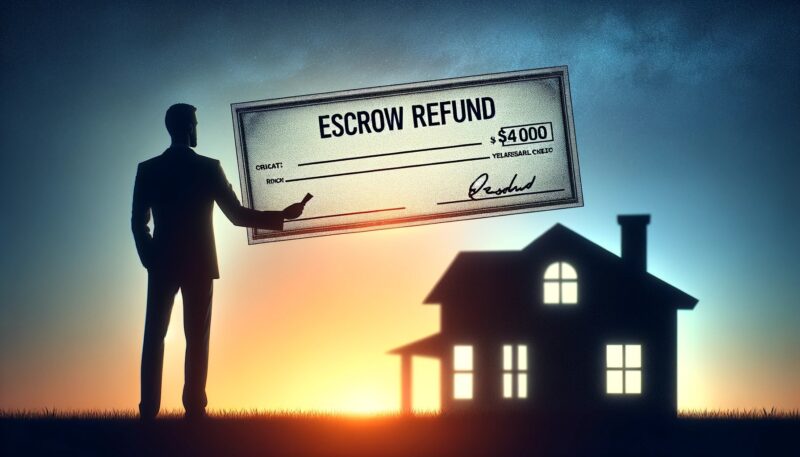Receiving an escrow refund check can bring a sense of relief and the possibility of financial flexibility, but it’s important to understand the optimal way to manage this unexpected income. As homeowners with mortgages, we often find ourselves contributing to an account that pays for things like property taxes and homeowner’s insurance.
There are moments when we overpay into these accounts, leading to a refund. This might occur due to an overestimate of our escrow payments or when our property taxes or insurance premiums cost less than anticipated.
Among the most important factors, you will find:
- Receiving an escrow refund offers a chance to improve our financial health.
- Strategic use of the refund can lead to long-term financial benefits.
- Assessing our financial situation is essential when deciding how to use the escrow refund.
Today, we want to talk about escrow refund checks in greater detail.
Managing Your Escrow Refund
When we receive an escrow refund check, it’s an indication of a surplus in our escrow account funds. The wise management of these funds can impact our financial stability, whether it’s readjusting the monthly mortgage payment or reinforcing our savings.
Reinvestment into Mortgage
Using the refund check to prepay our mortgage can reduce the principal and interest we will pay over time. If we direct the refund to our mortgage’s principal, this can be a strategic move to shorten the term of the loan and save on future interest payments.
Reinvestment into Savings and Investments
Alternatively, depositing the escrow refund into our savings account bolsters our financial safety net. It’s equally prudent to consider investing the surplus for potential growth, balancing the need for liquidity against the benefits of compounded returns over the long term.
Adjusting Escrow Payments
If our escrow account consistently ends in a surplus, it may be time to recalibrate. We can request an analysis of our monthly escrow payment and, if warranted, adjust it to more accurately reflect our actual expenses, leaving more in our pockets each month.
Reasons for Escrow Refunds

Escrow refunds can arise for a few reasons, primarily due to overpayments or changes in property-related expenses.
Overpayments and Overage Assessments
When we pay more into our escrow account than needed to cover taxes and insurance premiums, overage might occur. This is often detected during an annual analysis conducted by our mortgage servicer.
If the surplus exceeds the allowable cushion—often set by federal law—the excess funds typically result in a refund.
- Instances of escrow overage:
- Erroneous payment calculation.
- An actual reduction in property tax or insurance costs from the previous estimate.
Adjustments in Property Tax or Insurance
Refunds may also result from adjustments in property tax assessments or decreases in homeowners’ insurance premiums.
Here’s how these adjustments are processed:
- Property tax adjustments:
- If the tax authority revises the property’s assessed value or offers a tax exemption, our taxes may decrease.
- Insurance premium changes:
- Suppose the cost of our homeowners’ insurance policy comes down, either due to policy changes or premium discounts. In that case, we’ll pay less for insurance, causing a surplus in our escrow account.
Whenever there is a reduction in anticipated expenditures, and the account reflects a balance larger than required, we will receive a refund check from our mortgage servicer.
When to Expect a Refund?
In managing your mortgage, it’s crucial to know when and how you’ll receive any refunds. The process is highly regulated to protect homeowners, and we’ll explain what that means for the timing of your disbursement check.
Timing and Regulation
The Real Estate Settlement Procedures Act (RESPA) lays out clear rules regarding the timing of escrow balance refunds. We must ensure our account complies with Regulation X, which mandates an annual analysis to determine if any surplus exists.
If we discover a surplus of $50 or more, the Consumer Financial Protection Bureau requires us to refund the excess to you within 30 days of the analysis completion.
- Surplus Check: Issued if the surplus is $50 or more
- Timing: Within 30 days of post-escrow analysis
Disbursement Process
Upon completion of the analysis, if a refund is due, the disbursement check is processed. We handle this task efficiently to ensure you receive your escrow disbursement promptly. The exact date you’ll receive the check can vary due to postal service timing, but it usually arrives shortly after the 30-day regulatory window post-analysis.
- Disbursement: Issued once the surplus is confirmed
- Check Receipt: Typically received shortly after the 30-day post-analysis window
Keep in mind that while the regulatory framework provides specific timelines, we always aim to expedite the process without sacrificing accuracy or compliance.
Making Smart Choices

When we receive an escrow refund check, we are presented with a unique opportunity to reassess and reallocate our financial resources in a way that supports our home’s future and our financial well-being.
Managing Escrow Accounts
It’s essential to focus on the purpose and management of escrow accounts. They serve to facilitate the handling of property taxes and insurance payments, integrated within our monthly mortgage payment.
Fundamentals
An escrow account acts as a safeguard for both lenders and borrowers by ensuring that funds for property taxes and insurance expenses are collected monthly and held until their due dates.
- Property Taxes: We deposit a fraction of our annual estimate each month.
- Insurance: Similarly, we allocate funds monthly for homeowners’ insurance to avoid large lump-sum payments.
This systematic approach prevents us from facing large, one-time bills. The lender, or escrow servicer, disburses these sums when due, providing us peace of mind that essential payments are made timely and accurately.
Annual Account Analysis
Each year, our lender performs an annual escrow account analysis.
This process involves:
- Reviewing payment history and balances.
- Adjusting a monthly payment based on the actual expenses for property tax and insurance.
If there is a surplus or shortage, we’ll receive an escrow refund check or a request to pay the difference. We must understand this analysis to anticipate changes in our monthly payments and to budget accordingly.
Our proactiveness in managing these aspects ensures effective financial planning and mitigates the risk of unexpected financial burdens.
FAQs
What is the difference between deposit and escrow?
A deposit is a sum of money held to secure an agreement or assure payment, while escrow refers to a financial arrangement where a third party holds and regulates the payment of funds required for two parties involved in a given transaction.
Do you need money in escrow?
Yes, money is essential in an escrow agreement as it serves to protect both the buyer and the seller in a transaction. For the buyer, it ensures the seller meets the terms of the agreement, and for the seller, it protects against non-payment.
Which bank can open an escrow account?
Many banks offer escrow services. When choosing a bank to open an escrow account, it is vital to consider their reputation, fees, and the level of customer service they provide. Always select a bank that is recognized for its reliability and expertise in handling accounts. A good example is ICICI Bank.
Is escrow an account receivable?
No, escrow is not considered an account receivable. Accounts receivable represent a legally enforceable claim for payment held by a business for goods supplied or services rendered that customers have ordered but not paid for.
Summary
When we receive an escrow refund check, it’s crucial to assess our financial situation thoughtfully. Let’s handle our escrow refund responsibly by examining our financial priorities and taking action that reinforces our economic stability and peace of mind.
